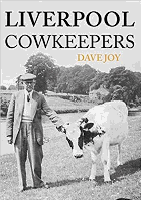|
LIVERPOOL COWKEEPERS: A FAMILY HISTORY
Our July 2018 talk - reviewed by Mike Chitty
Dave Joy grew up in Garston. His father ran the Wellington Dairy. Having recorded his childhood memories in the book 'My Family and Other Scousers', Dave realised that his family's experience was part of a much bigger story, in which farmers from the Pennine Dales became cowkeepers in Liverpool. For the past three years he has been telling that story all over the North West.
The Joy family farmed at Hebden, near Skipton, in the mid-19th century. The lead mining industry in that area was declining, while the trade and population of Liverpool was increasing rapidly. Milk didn't travel well, and Dales farmers started moving their cows to the city. End terraced houses - with the advantage of an accessible rear yard - were transformed into 'an extension of the home farm', with a shop at the front, dairy at the back, and living accommodation upstairs. In the yard was built a shippon, big enough for 6-8 shorthorn cows. All the milk produced by these cows was sold within the immediate vicinity.
There were no fields nearby, but the cows were well fed. Grass cuttings (from parks), bran and spent grain (from breweries), molasses (from sugar refineries) and oil seed cake were all readily available. Sawdust came from local sawmills. Straw and hay came from farms on the edge of the city - in exchange for muck!
The cowkeepers socialised, and inter-married, within their own community. The Liverpool Cowkeepers Association organised parties, dinners and outings. The Christmas Fat Cow Show at Stanley Abattoir and the Lancashire County Show (which was held annually - occasionally on the Mystery in Wavertree) attracted hundreds of entries from local cowkeepers. The corporate dairies claimed that their 'railway' milk was superior, and that 'local' milk was contaminated or watered down. The cowkeepers responded with the words 'Inspection Invited'. They proudly displayed their certificates and trophies in their dairies, and paraded their prize-winning cows through the streets.
In 1863 Orlando Joy and his sister Hannah had set up in business in Edge Hill. Later his brother George moved to Wavertree, and another brother, David, took over the Island Road Dairy in Garston. By the early 20th century the Garston business had moved to Wellington Road, and expanded. The new shippon was purpose-built for 13-14 cows, which were taken to and from grazing land at The Avenue twice a day. Several generations of Joys worked at the Wellington Dairy: Anthony (Dave's great-granddad), Anthony Percival (Dave's granddad, known as Percy) and Anthony Eric. Dave (Anthony David) explained that giving them all the first name Anthony avoided the need to repaint the signboard ('A. Joy & Sons') when someone died. His mother told him that this was because they were all 'tight-fisted Yorkshiremen'!
After WW2, things changed. The Milk Marketing Board was created, and road transport became more efficient. Many of the former cowkeepers (including the Joys) began to 'buy in' milk from the big dairies such as Hansons. However, the Joys continued to use horses for delivery until 1969 - the summer of memories that inspired Dave's first book.
As Dave's pictures revealed, some of the old cowhouses can still be recognised in the back streets of Liverpool. His talk sparked off a series of questions and reminiscences from the appreciative audience - and his two books (the second entitled simply 'Liverpool Cowkeepers') sold well.
|
|



